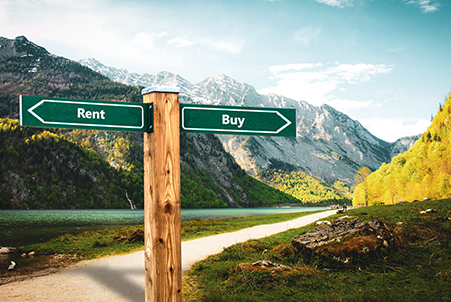If you’re a renter, you might find yourself considering whether you should buy a home instead – especially when your lease is about to expire. But it’s not always as simple as paying rent versus paying a mortgage. When you’re thinking about making the leap to homeownership, consider some of the factors that might come into play…
Cost
Of course, money will be a top consideration as you weigh your options. Be realistic about what you can afford. Homeownership isn’t just about the cost of your base monthly mortgage payment. Additional costs to consider include:
-
Insurance and property taxes: Most people pay them as part of their monthly payment to their lender, and it’s important to have a realistic view of how much these fees will add to your total payment. Your real estate agent can help you estimate these expenses to get started, and your loan originator can give you a specific amount later in the process.
-
Maintenance and repairs: From painting to replacing appliances, and from lawn care to changing your furnace filters, there’s a long and sometimes costly list of things you must do to keep your home in good condition. To protect yourself from surprise repair costs, HGTV recommends making sure you have 1-3% of your home’s cost saved for annual maintenance.
-
Utilities: Some new homeowners are shocked by the costs of all the utilities needed when you own a home – such as electricity, gas, water, internet and television services, and waste disposal. If you’re used to some or all of these expenses being included in your rent, do some research to find out how much they’ll add to the total monthly costs of homeownership. Your local utility providers can often give you an estimate based on square footage.
Both home and rental prices are escalating quickly right now. If your lease is expiring, evaluate your financial situation carefully to find out if investing in a home makes sense. Our Home Rent vs. Buy Calculator is a great place to start.
Members of the Household
No one can precisely predict the future, but the “buy or rent” decision must also focus on who will live there with you in the short- and long-term future. How will the number, age and relationship of those who will live in the space affect what you need from it? Lease expiration often prompts these considerations.
- Will someone else, such as a roommate or a partner, share the costs with you? Are those arrangements long-term, or likely to change from time to time?
- If being an empty nester is on the horizon, you might wish to have less space and less maintenance to worry about, potentially making renting a better choice.
- If you plan to add to your family, it’s wise to consider not only how much space you’ll need, but also how you’ll use it. Do you need more outdoor space or a larger kitchen? What about areas of your home for family members to spend time together?
Your Maintenance Skill Set
When you rent, there’s always someone you can call to address any issues with your home. The cost and the trouble of maintenance are the responsibility of the property owner or property management company.
When you own a property, however, you become responsible for all maintenance. Are you handy? Do you feel confident in your ability to learn these skills?
Learning to fix a toilet that won’t stop running, for example, is pretty easy with the help of the right YouTube video, but what about bigger tasks like masonry or HVAC work? DIY projects can save money, but you could also end up causing bigger, more expensive problems if your skills aren’t up to par. Be honest with yourself about your ability to handle – or budget for – maintenance issues.
Amenities
While amenities offered in rentals versus owned property can vary widely based on your location and the amount you pay, figuring out the most important features to you is a key factor in your decision. If they aren’t dealbreakers, they can sometimes break a tie as you choose to rent or buy.
-
Parking: Will a rental home or apartment be able to provide you with covered parking or a garage, or would you be forced to park on the street? How much parking space will you need now and in the future for you and those you live with? Depending on the area you’re looking in, parking can be a complicated issue, or hard to find altogether.
-
Laundry: Do you need a dedicated laundry room, or are you comfortable sharing with your neighbors? Owning a home isn’t a guarantee of an on-site washer and dryer. Older buildings and urban areas sometimes don’t offer these features, while many rentals in other areas do include in-unit laundry.
-
Recreation space: Do you want a pool or workout room? Do you want to shoulder the cost of having those on your own property, or would you rather rent or buy in a community that provides them? Many neighborhoods have amenities like playgrounds, pools, trails and sports courts, but beware: they often come with the additional cost of a monthly or annual homeowner’s association fee. Rentals often offer these amenities and include them in the cost of your lease payment.
As your lease draws near its expiration, the decision to renew, find a new rental, or buy a home can feel overwhelming. Use these considerations as a starting point to help you narrow down your options.
If you’re ready to buy a home, learn about the process with our checklist, 12 Important Steps to Prepare for Buying Your New Home, or contact one of our loan originators. We’d love to help you with your next home.

